In Last Child in the Woods, Richard Louv retells a moment in a restaurant when his son asked, “Dad, how come it was more fun when you were a kid?” Louv had been telling his 10-year old about how he caught crawdads by stringing bits of liver across a creek. When asked to explain, the son replied, “Well, you’re always talking about your woods and tree houses, and how you used to ride that horse down by the swamp.” At first, Louv thought Matthew was irritated and owns up to the fact that like other parents, he can romanticize his own childhood at the expense of his children’s current experience. But Matthew really felt that he had missed out on something, and Louv realized that his own childhood had been different.
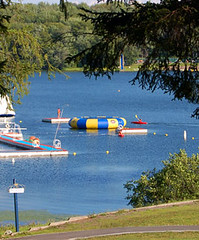 If you’re in Louv’s age bracket, you may also recall a childhood filled with a kind of free, natural play that today seems like an antique artifact compared to current kid’s lives. Lives filled with mobile devices, instant messaging, screen time, digital games and fears of “things” outside. In his book, Louv explores “the increasing divide between the young and the natural world, as well as the environmental, social, psychological, and spiritual implications of that change.” He discusses the accumulating research that implies that secure children (and adults for that matter) must connect with nature to fully develop. This need for contact with the natural world is as imperative as good nutrition and adequate sleep. So, while multiple reasons give us less and less time to connect outdoors, more and more studies suggest that embracing nature is a human necessity.
If you’re in Louv’s age bracket, you may also recall a childhood filled with a kind of free, natural play that today seems like an antique artifact compared to current kid’s lives. Lives filled with mobile devices, instant messaging, screen time, digital games and fears of “things” outside. In his book, Louv explores “the increasing divide between the young and the natural world, as well as the environmental, social, psychological, and spiritual implications of that change.” He discusses the accumulating research that implies that secure children (and adults for that matter) must connect with nature to fully develop. This need for contact with the natural world is as imperative as good nutrition and adequate sleep. So, while multiple reasons give us less and less time to connect outdoors, more and more studies suggest that embracing nature is a human necessity.
The ways in which children understand and experience nature has changed beyond recognition for Americans born during the last two decades. While children today may be more aware of the global threats to our larger environment, they are much less aware of their immediate natural surroundings. As children, Louv and his peers may not have discussed global warming, or holes in the ozone layer, but they loved “their woods” and fields intimately and felt connected to the people and their location in the world. They identified specific bends and crooks in creeks and holes in backyards—explored the woods in solitude, lay in fields listening to the wind and marveled at clouds shape-shifting overhead.
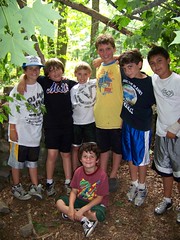 Louv discovered that many people yearn for what they have missed living in de-natured environments and they are consciously making choices and decisions to ensure that they will not be “the last children in the woods.” Families and intergenerational groups are finding ways to better live with nature and each other. Summer camp, for example, is one marvelous way for youngsters to make long-lasting memories and deep connections in natural surroundings. With easy access to the great outdoors and opportunities to develop self-reliance within a nurturing community, today’s campers will remember fun-filled childhoods unplugged from urban life—and share their unique memories with future generations.
Louv discovered that many people yearn for what they have missed living in de-natured environments and they are consciously making choices and decisions to ensure that they will not be “the last children in the woods.” Families and intergenerational groups are finding ways to better live with nature and each other. Summer camp, for example, is one marvelous way for youngsters to make long-lasting memories and deep connections in natural surroundings. With easy access to the great outdoors and opportunities to develop self-reliance within a nurturing community, today’s campers will remember fun-filled childhoods unplugged from urban life—and share their unique memories with future generations.
How can you make sure that you and your kids don’t miss out on the benefits of exploring outdoors? (For the record, I’ve been known to insist that my children at least squish mud between their toes and jump in puddles!)
Deborah-Eve


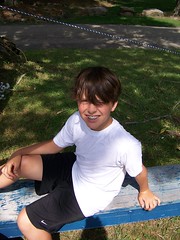 Nicolas had mostly attended an international school and studied English in Switzerland, so his communication skills were well developed and he felt comfortable with the prospect of adjusting to a new culture. He had also previously visited the United States and after switching to Swiss school last year, his mother wanted him to retain his fluency in English, learn about American culture first hand, and make American friends. Christine says there are a number of American camps that promote their programs in Switzerland but she avoided their outreach since she “did not want to send Nicolas to the United States just to meet other French guys!!!”
Nicolas had mostly attended an international school and studied English in Switzerland, so his communication skills were well developed and he felt comfortable with the prospect of adjusting to a new culture. He had also previously visited the United States and after switching to Swiss school last year, his mother wanted him to retain his fluency in English, learn about American culture first hand, and make American friends. Christine says there are a number of American camps that promote their programs in Switzerland but she avoided their outreach since she “did not want to send Nicolas to the United States just to meet other French guys!!!” Christine’s nieces both had a wonderful camp experience in the United States, but Christine felt that Nicolas would be more open to forging friendships and getting to know American kids, if he ventured on his own—and every mother understands that each child is different! Nicolas completely agreed about coming to camp on his own and since he was a little familiar with American culture and speaks English, that’s what worked for him.
Christine’s nieces both had a wonderful camp experience in the United States, but Christine felt that Nicolas would be more open to forging friendships and getting to know American kids, if he ventured on his own—and every mother understands that each child is different! Nicolas completely agreed about coming to camp on his own and since he was a little familiar with American culture and speaks English, that’s what worked for him.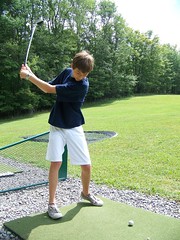
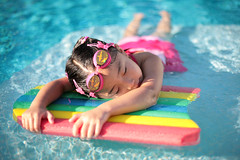 Even when you are right there next to your child to offer comfort, care and treatment, accidents and injuries can be difficult to deal with. So as we prepare our kids to go to summer camp, it is important to ask some questions of the camp and prepare our children well. That way, everyone can rest assured they are having a summer of fun and making memories to last a lifetime in a safe environment.
Even when you are right there next to your child to offer comfort, care and treatment, accidents and injuries can be difficult to deal with. So as we prepare our kids to go to summer camp, it is important to ask some questions of the camp and prepare our children well. That way, everyone can rest assured they are having a summer of fun and making memories to last a lifetime in a safe environment.
